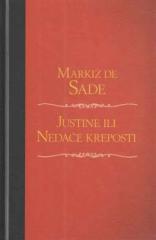Markiz Donatien de Sade
French writer (Paris, 2. VI. 1740 – Charenton, 2. XII. 1814) from an old noble family, marquis; 1754–63. was in the army service. Because of his open libertinism, especially the unusual morbid atmosphere of his orgies, he was briefly imprisoned several times, and in 1777 he was permanently imprisoned in Vincennes, where he began to write. From 1784 he was imprisoned in the Bastille, and from 1789 in the mental hospital in Charenton. Released in 1790. 1792–94. he was a lower official of the revolution. government. From 1804 he was imprisoned again in Charenton, where he remained until his death. In captivity, he transformed from a fashionable debauchee into a rebellious thinker and wrote a series of works that continue the tradition of morally instructive philosophies. discussion, but at the same time they are full of obscenity and obsession with evil. Along with the sexual pathology treatise 120 days of Sodome (Les 120 Journées de Sodome, 1785, published 1904), and the cynical libertarian dialogue Philosophy in the boudoir (La Philosophie dans le boudoir, 1795), his key work is the novel about the heroine Justine, published in 3 versions. The first, the least daring, is entitled Les Infortunes de la vertu (Les Infortunes de la vertu, 1787, published in 1930) and is closest in length and conception to philosophy. novels. The second version of the story, Justine or the Adversity of Virtue (Justine, ou les malheurs de la vertu, 1791), is seasoned with ugly scenes, close to an adventure novel and a character novel, with a heroine who narrates in the first person a series of sexual abuses that she experiences, but which she keeps untainted temper (which is made concrete by linguistic restraint). The third version, The New Justine or the Adversities of Virtue, accompanied by the Story of Juliette, her Sister, or the Advantages of Vice (La Nouvelle Justine ou les Malheurs de la vertu, suivi de l'Histoire de Juliette, sa sœur ou les Prospérités du vice, 1797) is lexically significantly more obscene, with more brutal and incredible scenes of orgies, and narration in the third person (thus concretizing the taking away of the voice of virtue). While in the depiction of Justina's fate, the same situations are constantly repeated (she is constantly punished by the dark forces of lust, due to her devotion to virtue), in the depiction of the morally corrupt Juliette's fate, there is no repetition, but a constant progression - it is a triumphant epic of evil. In 1800, Sade also published a poetic essay Thinking about the novel (Idée sur le roman), in which he presented the point of view that a novel must describe evil because it is the only thing that interests people and the only thing that is true. His extensive opus was partially destroyed after his death, but was constantly read in different editions. He was especially overrated by the surrealists, due to the systematic dismantling of all social hypocrisies and the consistent demonstration that there are no disembodied ideas.
Titles in our offer
Justine ili nedaće kreposti
"Justine or the Misadventures of Virtue" is a novel by the Marquis de Sade, first published in 1791.
